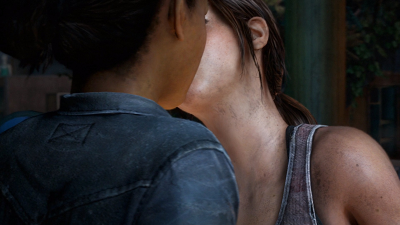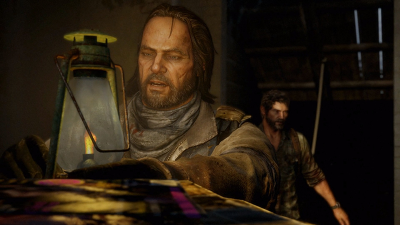The Last of Us leads in diversity

Ellie and Riley, who share a kiss in The Last of Us, are two of the three queer characters in the game. (Photography by Jennifer Stienstra/ The Sheridan Sun)
STORY BY JENNIFER STIENSTRA
It’s hard to find a game with a very diverse cast and good representation, but Naughty Dog’s The Last of Us, seems to do just that and make it look easy.
The game is set in a post-apocalyptic world that’s been torn apart by disease caused a contagious fungus that infects people and drives them violently mad. You play as Joel, who lost his young daughter 20 years prior when the outbreak first started. He must escort a teenage girl named Ellie, who is immune to the disease, to a rebel group known as The Fireflies so that a cure can be made.
While you do play a stereotypical scruffy, heterosexual white man, Naughty Dog did an excellent job writing in characters representing different races, well-written female characters, and ones who identify themselves as part of the LGBT+ community.
MORE RELATED TO THE STORY:
- Video games missing the mark with LGBTQ community
- The steel bikini is getting stale for women in video games
- Sheridan Plays Halo
Throughout the game, there are many diverse female characters, all with their own strengths and weaknesses and don’t fall into any stereotypes, much like the female characters in Dishonored. There’s Marlene, the leader of The Fireflies who, without spoiling anything, has to make tough decisions she isn’t happy about. Tess is a woman hardened by life under martial law and has no time or patience to fool around.
And then there’s Ellie, the teen who accompanies you throughout the whole game. Having never experienced what life was like before the apocalypse, she’s a tough girl who’s learned how to fight out of necessity but also displays a child-like curiosity about what life was like before. Often times she will make comments, such as how stupid it was for people to starve themselves for looks, and ask the player questions such as whether ice cream trucks were a real thing in the past.
The female characters feel like real people, something many games still lack.
In the game you meet up with Henry and Sam, two black characters who don’t fall into any unnecessary stereotypes, unlike characters in Saints Row and GTA who are displayed as gangsters, and are just trying to survive in a harsh world. Marlene, the Fireflies leader, is also a black woman. Seeing a character that’s a leader who’s a woman and black in a video game is definitely refreshing. Lastly there’s Riley, a friend in Ellie’s past who is also black but her skin colour doesn’t dictate her personality whatsoever.
It’s rare to find the option video games, with the exception of some RPGs such as Dragon Age or the Mass Effect series, to make a character part of the LGBT+ spectrum. The Last of Us not only features one queer character, but three. The best part is, none of them are the “sassy gay friend” or the “sexy lesbian”. There’s Ellie and Riley, best friends who had developed a romantic relationship and you wouldn’t even know that they were gay if not for the kiss they share in the Left Behind DLC (and stirred a bit controversy).
Then there’s Bill, a man you encounter in the main game who doesn’t seem at all like he’d be gay (or bisexual as the game never specifies). The only hint you get that Bill is queer is when Ellie steals a gay porn magazine to “see what all the fuss is about” Queer characters in video games are usually stereotypical or over-sexualized. In The Last of Us, the characters were just like anybody else, just as it is in the real world. They were just characters with ideas, a past and a personality, they just also happen to be part of the LGBT+ community.
One thing I disliked however is how Ellie and Riley’s relationship ended. Again, without spoiling anything, it ended in tragedy. I’ve seen this over and over again in different media; there are queer characters but then something awful happens, like in Brokeback Mountain. Sad relationships are all the rage these days but for once it’d be nice to see a happy ending for a lesbian couple.
It is possible for a game, a great game, to be inclusive and reflective of the real world. They’re just characters who are coincidentally women, or black, or queer, or even all of the above. There’s no reason not to include a diverse cast of characters, and it can make a good game even better.





